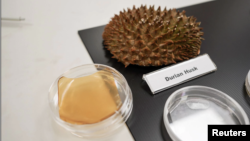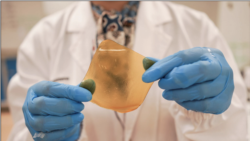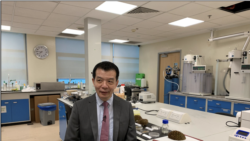Scientists at Nanyang Technological University (NTU) in Singapore have found a new way to handle food waste. They are turning unused durian fruit coverings, or husks, into antibacterial bandages.
The researchers took fibers from the fruit's husks after they were cut and dried. Then they mixed the fibers with a liquid called glycerol. This mixture becomes a soft substance called a hydrogel, which is then made into bandages.
The fruit's husks make up more than half of a durian’s structure. They are usually thrown away and burned, which adds to environmental waste.
William Chen is director of the food science and technology program at NTU. He said, "In Singapore, we consume about 12 million durians a year, so besides the flesh, we can't do much about the husk and the seeds and this causes environmental pollution."
Chen added that the technology can also turn other food waste, such as soybeans and grains, into hydrogel.
The hydrogel bandages can keep wound areas cooler and more moist than normal bandages which can help speed up healing.
The researchers say using waste materials and yeast for the antibacterial bandages is less costly than using normal bandages. The antibacterial substances in those bandages use more costly metallic compounds like silver or copper.
Fruit seller Tan Eng Chuan said he goes through as much as 1,800 kilograms of durian each day during durian season. He said being able to use the parts of the fruit that are usually thrown away would make enjoying durian, in his words, "more sustainable."
I’m Jonathan Evans.
Travis Teo and Lee Ying Shan reported on this story for the Reuters news service. Jonathan Evans adapted this story for Learning English. Mario Ritter, Jr. was the editor.
____________________________________________
Words in This Story
bandage –n. a covering, such as a strip of cloth, that protects or supports a part of the body that has been hurt
fiber –n. a thin piece of natural material
consume –v. to eat or drink; to use up
moist –adj. a little wet; not fully dry
sustainable –adj. able to be used without being used up; able to continue for a long time







